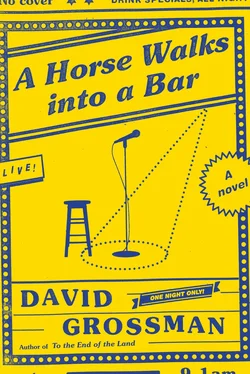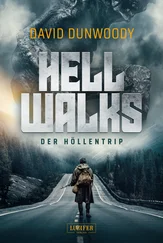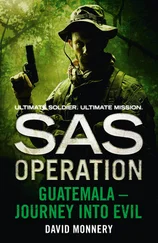“And then, a second before I manage to fall asleep, the driver goes: ‘Kid, can I ask you one more thing?’ I don’t answer. So much for sleeping. ‘I just want to know,’ he says, ‘are you purposely stopping it?’
“ ‘Stopping what?’
“ ‘I don’t know… It. Crying.’
“Right then and there I snap my mouth shut. I’m literally biting down. Not talking to him. I’d rather he tell another lousy joke than interfere. So we drive. Except that he, as you’ve already learned, is not one to give up easily. A minute later he asks me again if I’m holding it in or if I just don’t feel like crying.
“To tell you the truth, I don’t understand it myself anymore. The driver was right: I should be crying, that’s what orphans do, isn’t it? Or half orphans, I guess. But I have no tears, I have nothing, my body is like a shadow, no feelings at all. And also, how can I put this…It’s like nothing can really start until I actually know. Isn’t that so?”
He stops to wait for an answer from us, the remnants of his audience.
“Only my eyes,” he goes on softly, “are on the verge of exploding the whole time, but not from tears. No tears. From pain, just deadly pain pressing against my eyes.”
With the knuckles of both fists he crushes his eyes under his glasses. He rubs them for a long time, hard, like he’s trying to poke his eyes out of their sockets.
“ ‘In my family, may he rest in peace, there was a brother who died,’ the driver tells me. ‘Five years old, he drowned. And even though I never knew him, I always cry over him.’
“And he really did start crying the minute he talked about him. The tears ran down his face in a straight line. ‘I don’t get how you can be like that,’ the driver says, and he can barely talk, he’s sobbing like a kid. And I look at his tears, and he doesn’t wipe them away, and the stripe wets his cheek and drips down onto his uniform shirt, and he doesn’t wipe it, not with his hand or anything. The tears just flow unrestrained, as much as he wants. But not with me. It’s like something in my brain is stopped up, stuck, I have a brain clog, but if the something could break free, then I could start. And this whole time, don’t forget, I keep thinking that maybe he knows something, maybe he picked something up when he was in the commander’s barracks, and why doesn’t he tell me, and why don’t I just ask him and be done with it, it’s just two words, for God’s sake, why don’t I just shut my eyes hard and throw the question out and come what may?
“Hey, guys! Guys!” he suddenly raises his voice and waves his arms, and people in the audience—all of us, really—flinch as if we’d been shaken out of a dream. We laugh awkwardly. He takes the red handkerchief out of his pocket and mops his sweat, then pretends to wring out the handkerchief, whistling to himself. “You know what I was thinking? The human brain…It never stops working for a second. It works weekends, holidays, even Yom Kippur. Lousy labor contract that brain negotiated—what was it thinking? But what was I going to…Oh, yeah. Imagine there’s a country somewhere in the world where the legal system works like this: the judge sits there, bangs his gavel, and declares: ‘The defendant will now rise!’ ” He straightens up, stands stiffly, and slides me a look. “ ‘The court finds you guilty of armed robbery, and hereby sentences you to thyroid cancer.’ Or, let’s say, a panel of three judges finds you guilty of rape and sentences you to Creutzfeldt-Jakob disease. Or they say this: ‘The court is informed that the prosecution has entered a plea bargain with the defense, and so instead of that German dude, Alzheimer, the defendant will only undergo a stroke. And for tampering with evidence he’ll get an irritable bowel.’ ”
The shrunken audience laughs halfheartedly and he gives us a sly sideways look. “You know how the minute you get a disease, especially if it’s a really juicy one, the kind with excellent potential to develop, I mean, to degenerate, then every person you run into tries to prove to you how it’s actually not that bad? On the contrary! They all know someone who heard about someone who’s been living with MS or liver cancer for twenty years, and their lives are awesome! Never been better! And they make such a big deal convincing you how awesome and cool and super-duper it is that you start thinking you must have been an idiot not to get you some of that sclerosis ages ago! You could have had such a fabulous life together! You could have made such a great couple!”
With these words he breaks into a tap-dancing routine that ends with a “Ta-daaam!” and his arms spread wide, kneeling on one leg, sweat pouring down his face. No one in the audience is capable of clapping. People swallow drily and look at him with bewildered eyes.
“Okay, so we’re off again. We’re on the road, Jokerman and your disloyal servant—fuck, I’m so disloyal.” He tries to get up from his bent knee, succeeding on the third try. “We’re hot, we’re dry, we have flies in our eyes, flies in our mouths. You know what? I take back what I said before: I don’t think about that drive very much. I mean, not when I’m awake, only once in a while I get these flashbacks, the windowpane and the way my head rattled on it. Or how I kept seeing the driver covering his teeth with his lips. Or how there was a tiny hole in the upholstery of my seat, which I stuck my finger in almost the whole way, and it was foam rubber, and you’ll laugh but I’d never seen that stuff before, ’cause in my house we had straw mattresses, and I liked the feeling of the foam rubber, and the whole time I was in the pickup I felt like it was some kind of magic substance from another place, this noble matter that was protecting me, and I imagined that the minute I took my finger out of the hole everything would fall in on me. That kind of crap is what stuck in my mind about that drive, to this day, and when it comes back it’s usually at night, in my dreams, and then it’s feature length, and it’s kind of funny that it happens almost every night, can you imagine how boring that is— Yo, projector! Why do you keep showing the same movie?! And then the driver, without looking at me, suddenly goes: ‘But you haven’t told me yet who—’ ”
Dovaleh glares at us with those befuddled eyes. He stretches the corners of his lips exaggeratedly and tries to force us to smile with him. No one smiles. He opens his eyes even wider and blinks quickly. His face is completely clownish now. He bobs his head up and down a few times and mouths silently: Not funny? Really? That’s it? I’m not funny anymore? I’ve finally lost it? He drops his head to his chest and conducts a silent exchange with himself, complete with hand gestures and hyperbolic facial expressions.
Then he falls silent. Still.
The little woman somehow knows what is coming before the rest of us do. She shrinks back and puts her hands over her face. The fist flies so fast that I hardly see it. I hear the click of teeth hitting one another, and his whole face seems to wrench away from his neck for an instant. His glasses fall to the floor. He doesn’t alter his expression. Just breathes heavily in pain. With two fingers, he props up the corners of his mouth: Still not funny? Not at all?
The audience is frozen. The two bikers sit with their faces pulled taut and their ears pricked up, and it occurs to me that they knew this moment would come—that it’s the reason they came.
Now he screams: “No? Not at all? No, no, no?” He slaps his face, ribs, stomach. The spectacle looks like a fight between at least two men. Within the whirlwind of limbs and expressions I recognize the countenance that has passed over his face more than once this evening: he is uniting with his abuser. Beating himself with another man’s hands.
Читать дальше












